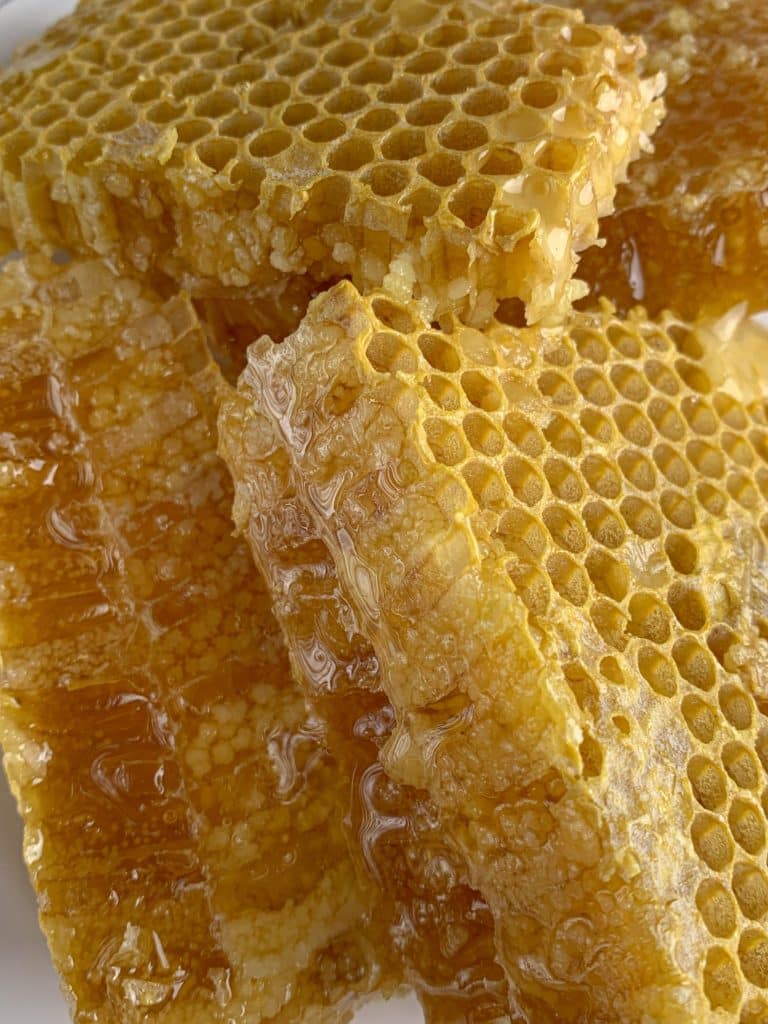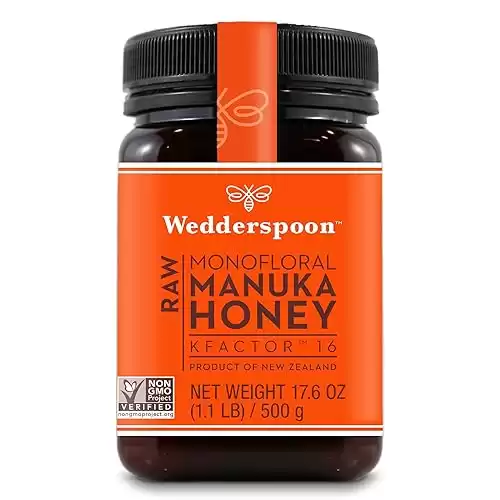13 Manuka Honey Benefits That Will Blow Your Mind
Growing up you probably knew that local honey had it’s health benfits including helping you get rid of a nasty cough or sore throat. It’s also a great sweetener that is natural and full of vitamins and minerals. However, you may not be familiar with Manuka Honey Benefits, so keep reading to learn why you need this food in your life.

Table of Contents
What is Manuka Honey?
Manuka honey is honey produced from the manuka plant and it has medicinal properties that cause it to be anti-inflammatory and anti-microbial.
Manuka honey is typically a more expensive and harder to find honey than your regular raw local honeys.
A professor in New Zealand named Peter Molan was one of, if not the first person to report on Manuka honey benefits. Manuka honey has many therapeutic healing benefits including shrinking the size of bacterial cells.
How should I consume Manuka honey?
You can eat it off of a spoon, add it to a tea, add it to your kids sippy cups (just make sure it is thin and watery and test for allergies), sweeten your coffee or apply it topically.
Drink hot water or tea with a little bit of lemon and Manuka honey to help hydrate you.
What are the different types of Manuka Honey?
There are monofloral and multifloral honeys, meaning the honey is sourced from one flower or multiple. It can be hard to control or track if some other flowers honey gets put into the Manuka Honey but you can test to see if the Manuka is potent and has a strong antibacterial property.
MGO– the antibacterial property of Manuka honey
Leptosperin– this helps someone distinguish the difference between a manuka honey and other honeys.
Hydroxymethylfurfural– this is converted to MGO after the bees turn it into honey.
What are the best Manuka Honey Benefits?
These are some Manuka honey benefits as well as regular honey benefits, but the manuka honey contains additional immune benefits.
1. Fighting Cancer
There is a decent amount of research showing that one of the most popular Manuka honey benefits is it’s anti-cancer properties. It works by controlling molecular processes, antioxidant properties, antimicrobial and antiproliferation properties.
2. Wound Healing
Manuka honey benefits include the wound healing benefits of glyoxal and methylglyoxal (MGO) when the honey is applied topically to a wound.
3. Infection Fighting
Manuka honey has antimicrobial, antibacterial and antiproliferation properties. Therefore it is great to add to teas, take by itself on a daily basis to fight infections and give to old enough children.
4. Energy
Manuka honey’s naturally high carb content is helpful for athletic performance and overall energy. It can actually be used to replace instead of glucose in sporting events.
So next time you reach for a gatorade, switch it up with some manuka honey to get it’s antioxidative and wound healing properties as well as it’s energy and high vitamin and mineral content.
5. Lowers Blood Sugar in Diabetics
Honey has been shown to lower blood sugar in diabetics because of the fructose’s benefits and abilities to actually slightly improve insulin response.
Honey does not spike your blood sugar like other sweeteners do, it has minimal impact on blood glucose levels post meal. It realeses glucose into the bloodstream slowly to help you have a natural energy and not a boost and then a sudden crash. (Ajibola et. al., 2012)
- Our Manuka Honey is raw, never pasteurized,
- Non-GMO Project verified Manuka Honey, traceable from hive to home.
- Enjoy one 17.6 Oz BPA free, a non-leaching poly jar filled with delicious KFactor 16 honey
- One of nature’s true superfoods, with multiple uses. Have a spoonful daily health for well-being; immune boosting home remedies and DIY skincare.
6. Improves Digestion
Honey contains natural enzymes that help your body better digest carbs and starches. It is also easier to digest than other sweeteners because it is mostly made of monosaccharides. (Ajibola et. al., 2012)
Make sure you get a raw Manuka honey because the enzymes will be active verus if it is heated and more processed, those enzymes can easily be killed off.
Honey contains prebiotic fibers called oligosaccharides, that help feed healthy bacteria such as bifidobacteria that help with constipation, diarrhea and overall healthy bowel movement. (Ajibola et. al., 2012)
7. Improves Bone Density
Honey is a great source of calcium and it can help individuals fight osteoporosis because it is easily absorbed and calcium rich.
8. Improve a Child’s Mind
Research shows that honey helps children decrease anxiety, improve their memory and it can help them later in life.
Children under 2 years old you should be cautious when giving them honey as it can be a choking risk. Consult with your doctor and IF you give them any, only do it melted and in very small amounts.
Research showed compared to sterile water, honey helped crying infants feel calm. It also helped them have a steady weight gain, clear skin and less susceptibility to diseases.
9. Anaemia Relief
Honey consumers have shown to have increased hemaglobin and increased blood production.
10. Dental Health
Honey is helpful in fighting gingivitis and dental plaque because of it’s antibacterial properties. It can stop erosion from fruit juices and slow the damage.
11. Protection from Ulcers
Honey works to fight bacteria such as Helicobacter pylori that causes issues such as ulcers and gastritis. It’s antioxidant properties help fight with these issues as well as it helps maintain natural glutathione levels.
12. Fights Skin Infections
The antiseptic properties of honey make it a great aid for burns and surgical wounds. (Ajibola et. al., 2012)
Often times cancer patients have many wounds from chemo and radiation treatments that could be improved by honey applied topically and ingested. This way it works on healing and fighting cancer, as well as repairing wounds on the outside.
13. Weight Loss/ Cholesterol
Honey had a SLIGHT effect on weight loss and fat loss in a research study but it had a greater impact on lowering total cholesterol especially in with triglycerides, and CRP levels. CRP is an inflammatory marker that tells you your risk for heart attack. (Yaghoobi et. al., 2008)
HDL (good cholesterol) is raised by honey and blood sugar was lowered in a recent study. (Chepulis et. al., 2008)
Why is Manuka Honey so Expensive?
Manuka honey is very rich in it’s antibacterial properties and the strength of this is rated by the Unique Manuka Factor (UMF). This can be found on the Manuka honey packaging and it tells us the that the Manuka honey is in fact from the Manuka plant and it contains all three DHA, MGO, and Leptosperin and in what strengths.
Because Manuka honey has so many benefits and it’s from one specific flower, it costs more due to it’s rareness.
It can only be harvested for about 2-6 weeks out of the year, making it a very tedious process that requires for it to be taken great care of.
Can Manuka Honey Be Consumed Everyday?
Yes! It is actually recommended because it is full of vitamins and minerals. It’s health benefits are more effective if taken consistently.
Honey in general is high in potassium, zinc, calcium and iron. (Ajibola et. al., 2012)
All the reasons above show that taking manuka honey on a daily basis and switching out your artificial sweeteners can be very helpful to improve your health.
Who should not eat manuka honey?
Anyone with a bee allergy, or a lot of food sensitivities should only try it in small amounts.
Is Manuka Honey Worth the Money?
There are a LOT of Manuka honey benefits that make it well worth it’s price tag. Being that it is a natural food and it the plant is found in New Zealand, keep in mind that it is hard to come by but it is very nutrient dense and has many healing benefits.
It can be used topically or ingested to help fight infections and heal wounds. Considering how many benefits this one food can have, it is definitely something you should make a staple in your home and you can utilize it for multiple home remedies.
In Summary
Manuka honey benefits include topical and interal benefits. It is a sacred nutrient that is hard to come by and it mostly from Manuka plants in New Zealand. It has anti-inflammatory, antioxidative and antiseptic properties, therefore the uses are endless.
References:
Ajibola, A., Chamunorwa, J. P., & Erlwanger, K. H. (2012). Nutraceutical values of natural honey and its contribution to human health and wealth. Nutrition & metabolism, 9, 61. https://doi.org/10.1186/1743-7075-9-61
Chepulis, L., & Starkey, N. (2008). The long-term effects of feeding honey compared with sucrose and a sugar-free diet on weight gain, lipid profiles, and DEXA measurements in rats. Journal of food science, 73(1), H1–H7. https://doi.org/10.1111/j.1750-3841.2007.00592.x
Yaghoobi, N., Al-Waili, N., Ghayour-Mobarhan, M., Parizadeh, S. M., Abasalti, Z., Yaghoobi, Z., Yaghoobi, F., Esmaeili, H., Kazemi-Bajestani, S. M., Aghasizadeh, R., Saloom, K. Y., & Ferns, G. A. (2008). Natural honey and cardiovascular risk factors; effects on blood glucose, cholesterol, triacylglycerole, CRP, and body weight compared with sucrose. TheScientificWorldJournal, 8, 463–469. https://doi.org/10.1100/tsw.2008.64
Originally posted 2022-02-21 05:08:02.
Megan Santiago
Latest posts by Megan Santiago (see all)
- How to Find a Trauma Therapist in Tampa - September 30, 2024
- The Best List of Jobs for People With Social Anxiety! - March 10, 2024
- Relaxation Techniques for Anxiety, Depression & Mental Clarity - March 10, 2024

